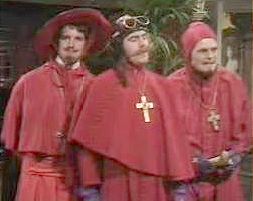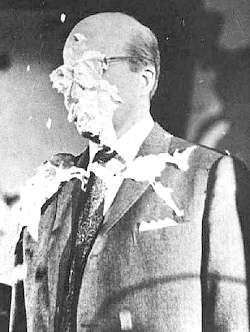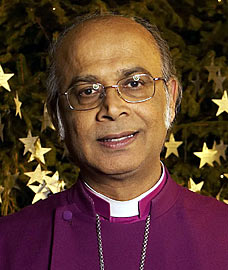
Appears the doc has stepped in it again...
Christian doctrine is offensive to Muslims, the Archbishop of Canterbury said yesterday.
Dr Rowan Williams also criticised Christianity's history for its violence, its use of harsh punishments and its betrayal of its peaceful principles. His comments came in a highly conciliatory letter to Islamic leaders calling for an alliance between the two faiths for 'the common good'.
Maybe they'll autograph his kneepads? Or pay for the Vaseline?
But it risked fresh controversy for the Archbishop in the wake of his pronouncement earlier this year that a place should be found for Islamic sharia law in the British legal system. Dr Williams is also facing immense pressures from inside his own Church of England and Anglican Communion. A gathering of Anglican bishops from around the world, which begins today, is on the brink of a devastating split over whether homosexuality and gay clergy should win their approval.
Looks like Trouble in Druid City...
I'm waiting for the gay imams to show up in Islam. And the ruling that devout Muslims can have up to four gay concubines at a time.
I'm waiting for the ordination of female imans.
The Archbishop's letter is a reply to feelers to Christians put out by Islamic leaders from 43 countries last autumn. In it, Dr Williams said violence is incompatible with the beliefs of either faith and that, once that principle is accepted, both can work together against poverty and prejudice and to help the environment.
...and everyone can have cake and ice cream.
He also said the Christian belief in the Trinity - that God is Father, Son and Holy Ghost at the same time - 'is difficult, sometimes offensive, to Muslims'. Trinitarian doctrine conflicts with the Islamic view that there is just one all-powerful God.
Oh, well. Guess we'd better junk it then.
Dr Williams added: 'It is all the more important for the sake of open and careful dialogue that we try to clarify what we do and do not mean by it, and so I trust that what follows will be read in this spirit.' He told Muslim leaders that faith has no connection with political power or force, and that Christians have in the past betrayed this idea. 'Christianity has been promoted at the point of the sword and legally supported by extreme sanctions,' Dr Williams said.
Yeah. We're lucky Islam ain't like that. Probably get a lotta people killed. Oh, wait...
I was thinking the same thing last week as I was forcibly converting some Egyptian Muslims.
Islam, he continued, has been supported in the same way and 'there is no religious tradition whose history is exempt from such temptation and such failure.'
INFIDEL! Take it back or we'll kill you!
The Archbishop appeared to rebuke his colleague, Bishop of Rochester Dr Michael Nazir-Ali, who criticised his sharia lecture and who maintains that Christianity is central to British law, politics and society. 'Religious identity has often been confused with cultural or national integrity, with structures of social control, with class and regional identities, with empire: and it has been imposed in the interest of all these and other forms of power,' he said.
The Archbishop said that faiths which reject the use of violence should learn to defend each other in their mutual interest. 'If we are in the habit of defending each other, we ought to be able to learn to defend other groups and communities as well,' he said. We can together speak for those who have no voice or leverage in society - for the poorest, the most despised, the least powerful, for women and children, for migrants and minorities; and even to speak together for the great encompassing reality that has no voice of its own, our injured and abused material environment.'
Can't we all just...get along.
He's saying that his brand of Christianity lacks testosterone, to the point where it's unwilling to compete with the Profit's evil henchmen, so the henchmen should protect him. This is a position known as dhimmitude and I've no doubt the Archdruid will be quite happy to pay his jizya.
The Archbishop did not mention sharia at all in his closely-argued 18-page letter. Dr Williams was heavily criticised by MPs and Downing Street after he suggested sharia law could have an established place in British life. But his letter in reply to last year's Islamic approach, A Common Word for the Common Good, chimes with his view expressed in February that people of faith should be able to work together against secularism despite their differences. Lambeth Palace hinted that Christians as well as Muslims should listen to Dr Williams' message. Officials pointed to the Archbishop's call for 'religious plurality' to turn to serving the common good and added: 'This is true even where truth claims may seem irreconcilable'.

 The Bishop of Rochester, the Rt Rev
The Bishop of Rochester, the Rt Rev  The Archbishop of Canterbury was facing demands to quit last night as the row over sharia law intensified. Leading bishops publicly contradicted Dr
The Archbishop of Canterbury was facing demands to quit last night as the row over sharia law intensified. Leading bishops publicly contradicted Dr  The Archbishop of Canterbury says the adoption of certain aspects of Sharia law in the UK "seems unavoidable".
The Archbishop of Canterbury says the adoption of certain aspects of Sharia law in the UK "seems unavoidable".